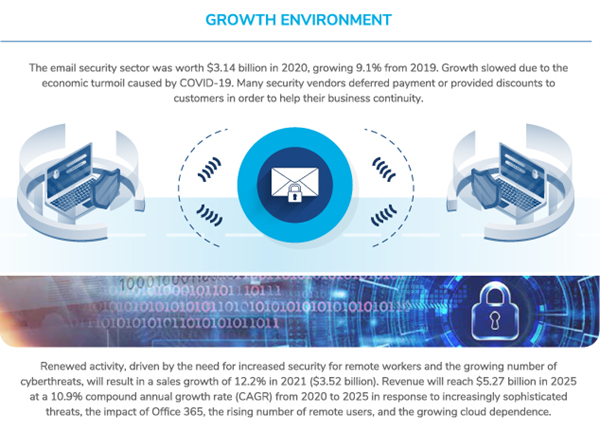A Benchmarking System to Spark Companies to Action - Innovation that Fuels New Deal Flow and Growth Pipelines
The report analyzes the global market for Email security and presents this in the Frost Radar™. This measures growth rates in addition to absolute revenues and combines them with several other factors to measure companies’ performance along the growth axis. Companies are also measured along an innovation axis. Companies plotted on the Frost Radar™ are the leaders in the industry for growth, innovation, or both. They are instrumental in advancing the industry into the future. Email is still the number one threat vector. It is the most used mode of corporate communication and remains the de facto standard for B2B and B2C communications. Email is now the primary channel for business communication highlighted further by the surging trend of Work From Home (WFH).
In the last few years the complexity and volume of threats have increased significantly. Email-based threats have become big businesses targeting specific verticals as well as individuals within organizations. Threat vectors continue to evolve. The need for secure email has never been stronger. Attackers are focusing more on people and less on systems. Business Email Compromise (BEC) fraud continues to affect organizations large and small.
Consequently, traditional security solutions that are designed to protect systems and infrastructure are now inadequate. There has been an increase in sophisticated and highly targeted email-borne attacks. Many attacks use social engineering techniques. For businesses of all sizes, this is a serious problem as the legitimate communication channel they rely on extensively, email, is also the channel-of-choice for delivering malware and malwareless attacks. There are more sophisticated attacks combining email and cloud accounts.
Cybercriminals are leveraging the fear and uncertainty concerning COVID-19. The most significant trend in the email security market is the acceleration of organizations migrating to the cloud. Customers are adopting cloud-based mailbox services and migrating and augmenting their email security to the cloud from on-premises appliances. The high adoption rates for Microsoft Office 365 have caused the biggest loss of email security posture for organizations. Organizations are looking for integrated solutions that enable them to consolidate vendors and increase operational efficiencies while gaining stronger, comprehensive security. In such a competitive environment, email security vendors need to differentiate.
Table of Contents
1. Strategic Imperative and Growth Environment
- Strategic Imperative
- Growth Environment
2. Frost Radar™
- Frost Radar™: Global Email Security Market
- Frost Radar™: Competitive Environment
3. Companies to Action
- Agari
- Barracuda Networks
- Broadcom (Symantec)
- Cisco
- Check Point
- FireEye
- Forcepoint
- Fortinet
- Mimecast
- Proofpoint
- Sophos
- Trend Micro
4. Strategic Insights
5. Next Steps: Leveraging the Frost Radar™ to Empower Key Stakeholders
- Significance of Being on the Frost Radar™
- Frost Radar™ Empowers the CEO’s Growth Team
- Frost Radar™ Empowers Investors
- Frost Radar™ Empowers Customers
- Frost Radar™ Empowers the Board of Directors
6. Frost Radar™ Analytics
- Frost Radar™: Benchmarking Future Growth Potential
- Legal Disclaimer
Companies Mentioned (Partial List)
A selection of companies mentioned in this report includes, but is not limited to:
- Agari
- Barracuda Networks
- Broadcom (Symantec)
- Cisco
- Check Point
- FireEye
- Forcepoint
- Fortinet
- Mimecast
- Proofpoint
- Sophos
- Trend Micro









